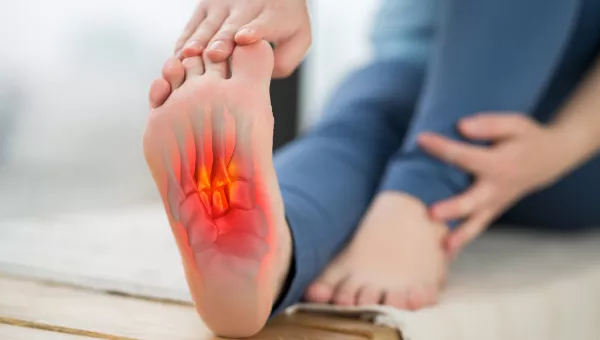The podiatrists at Cape Fear Valley Health are experienced in treating plantar fasciitis. We’re here to help you reduce your foot pain and get back to the activities you enjoy.
Plantar Fasciitis Symptoms
Plantar fasciitis is a very common foot condition. The most characteristic symptom is a sharp, stabbing pain in the bottom of the heel.
This pain is often most intense with the first few steps after waking up or after prolonged periods of rest. Pain can also be triggered or worsened after long periods of standing or being active.
You might also feel stiffness in the foot upon waking up, which gradually eases as you move around. The bottom of the foot, particularly the heel, might be tender to the touch.
Another common sign of plantar fasciitis is difficulty or discomfort when pulling the front of the foot up toward the shin.
When to Seek Care for Plantar Fasciitis
While plantar fasciitis is often treated with home remedies, you should seek out a healthcare provider if you’re experiencing:
- Pain that lasts more than a few weeks
- Pain that is severe and keeps you from your usual activities
- Trouble walking or putting weight on your foot
- Swelling or redness
- Numbness or tingling
While plantar fasciitis is a common and treatable condition, it's essential to get an accurate diagnosis. Other conditions can mimic its symptoms, so seeing a podiatrist or healthcare professional ensures proper treatment and a speedy recovery.
Plantar Fasciitis Treatment at Cape Fear Valley Health
Cape Fear Valley Health’s podiatrists offer many different options for treating plantar fasciitis, depending on the severity of your symptoms.
Your exact treatment plan will depend on your symptoms and overall health but generally includes:
- Avoiding activities that cause pain
- Applying cold packs to reduce inflammation
- Wearing shoes with cushioned doled and good arch support
- Performing gentle stretching
- Using shoe inserts (orthotics) for additional support
- Using over-the-counter pain relievers
If your condition doesn’t respond to these treatments, your podiatrist might suggest physical therapy or a special night splint.







